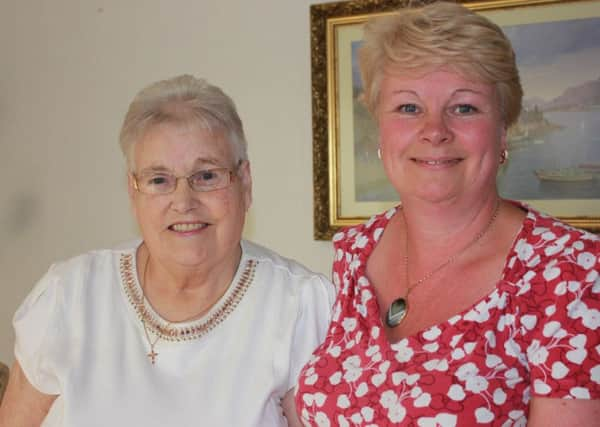Ballymena great-granny in 999 heart attack appeal


According to a snap poll by a leading health charity, six out of 10 people wouldn’t drive to hospital or call an ambulance if they had chest pain or other symptoms of a heart attack.
Amelia Thompson’s family remember the weekend she had her first heart attack, as it was the day after daughter Hazel’s wedding in 1987.
Advertisement
Hide AdAdvertisement
Hide AdHazel explains, “Mammy had been running around getting everything prepared for the wedding. Despite feeling unwell, she had been so busy, as mums are when their daughters get married, so she had ignored it. Besides, she did not want to bother anyone. She didn’t want to spoil my day.”
Amelia takes up the story: “All day at the wedding, I felt lethargic and unwell but I didn’t know what it was. By the time I was going to bed, I had pains in my arm and chest but just took a painkiller and went to sleep. Over the next couple of days I was still tired and even had to go to my bed with a house full of visitors, something I would never normally do. Finally on the Monday, a friend called the doctor and he sent me on to the hospital. The doctor there told me that I’d had a heart attack.”
Over the next two weeks, Amelia had two more heart attacks, one so severe that the family were all called to her bedside. Over the next few years, she had bad angina, a number of heart attacks, a triple bypass, and finally, last year, was fitted with a pacemaker. She has also had a stroke and been diagnosed with a condition called Atrial Fibrillation (AF) which is an abnormal heart rhthym.
Hazel continued, “Mammy has had a number of health issues over the years but is a fighter. She has been through so much and yet she still has a smile for us all. She has arthritis and sometimes the chest pains can be confused with arthritic pain, but over the years she has learnt that when the pain goes down her arms, it is a heart attack and she has to phone 999.
Advertisement
Hide AdAdvertisement
Hide Ad“She will be 81 this year. She is an inspiration to us all. She has 6 children, 11 grandchildren and now has one great-grandchild. I am so proud of her. She inspired my son to do medicine and he has just completed his first year at Queen’s University.”
Hazel also paid tribute to her father who, at nearly 78 years of age, cares for his wife. The couple are looking forward to celebrating their 60th wedding anniversary next year.
Hazel concluded, “We have been lucky Mammy has been spared so many times. We are so thankful for that. But we also want to use our experience to tell others how important it is to act when the symptoms of a heart attack appear.”
Fidelma Carter, Director of Public Health at NI Chest Heart & Stroke, said: “Thankfully Amelia has survived many health scares, but that is not the case for everyone. There’s no time to waste when chest pain strikes. Every minute that passes can mean the difference between life and death. We’re advising people to call 999 rather than driving the patient to hospital, because the ambulance crew can provide treatment at the scene.”
Advertisement
Hide AdAdvertisement
Hide AdInformation on the symptoms of heart attack can be found on the NICHS web site www.nichs.org.uk/stop.
The charity’s snap survey was carried out at the recent Balmoral Show. The STOP campaign will run from July until September.
Northern Ireland Chest Heart & Stroke is warning that fast action is crucial and has launched its STOP campaign in an effort to save lives.
STOP is an acronym for:
S - Something’s not right – symptoms can start slowly
T - Tightness or pain in the chest, pain in the arm, neck or jaw
O - Other symptoms such as shortness of breath, nausea or sweating
P - Phone 999 immediately – the ambulance crew will do an ECG.